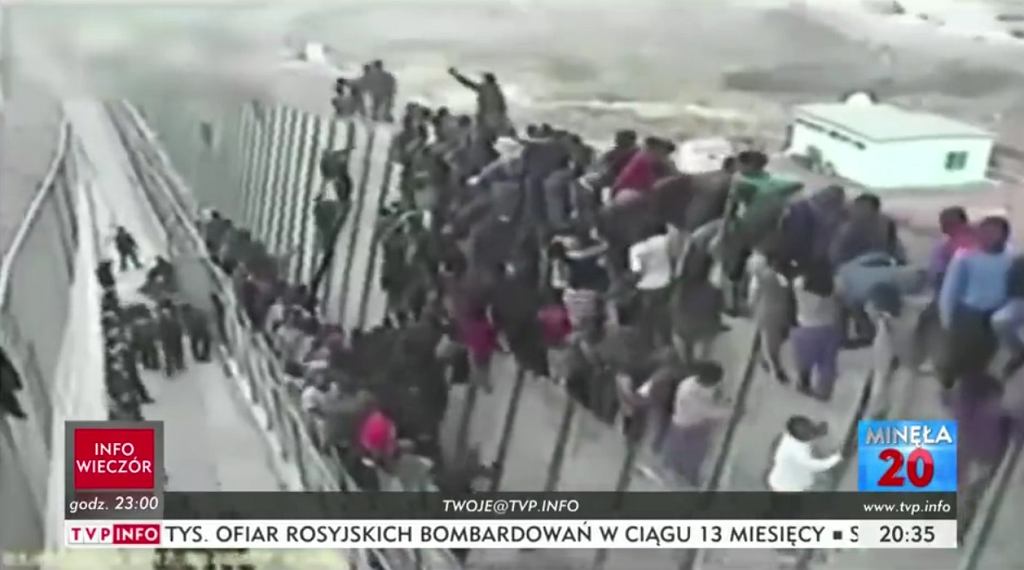Poland’s state broadcaster, TVP, must apologise for a news report that presented immigrants in a “one-sided, selective and unacceptable” manner, a court has ruled. The station must also pay 50,000 zloty (€11,100) to an immigrant support centre.
The ruling, issued by Warsaw’s court of appeal and which is now final, relates back to a segment broadcast in October 2016 by TVP Info, the public broadcaster’s 24-hour news channel.
TVP has since late 2015 been under the influence of the ruling national-conservative Law and Justice (PiS) party and, in January 2016, former PiS MP Jacek Kurski was made head of the station. Its coverage has often reflected the agenda of the government, including its pledges to prevent the arrival of Muslim refugees.
The report at the heart of this week’s ruling, aired on TVP Info’s flagship evening new show Minęła 20, focused on how the opposition mayor of Gdańsk, Paweł Adamowicz, had appointed an “immigrant council” made up of 12 foreign inhabitants of the city.
TVP reported on the news critically, playing a montage of clips (none from Poland) purporting to show immigrants behaving aggressively. As dramatic music played, an on-screen caption read “the mayor of Gdańsk invites immigrants to his city”.
The segment then featured quotes by Adamowicz in which he said “there are no true Poles”, “each of us is a periodic table of nationalities”, and that this mixed heritage “enriches us”.
After the clip was aired, Poland’s broadcasting regulator, KRRiT, received 36 complaints from viewers. TVP Info subsequently removed the clip from its website and social media accounts and suspended the employee responsible for creating it. In a letter to KRRiT, Kurski said that the material had had “certain technical flaws”.
The municipal authorities in Gdańsk nevertheless decided to take legal action against TVP for “violating the rights” of the city through the misleading coverage. In January last year, a lower-instance court ruled in Gdańsk’s favour, but TVP decided to appeal.
Yesterday, in a binding ruling, the court of appeal in Warsaw upheld the initial decision. It ordered TVP to publish an apology for “violating the city of Gdańsk’s…good name, public credibility and social trust in xenophobic and racist video material”.
The apology must be made available this weekend on TVP Info’s website and social media accounts. The station must also pay 50,000 zloty to the Immigrant Support Centre in Gdańsk.
“Undoubtedly, this material was prepared in an unacceptable manner, which did not comply with the seriousness and mission of public television,” said judge Małgorzata Kuracka in her oral justification. “It was very one-sided and selective.”
The judge emphasised that TVP Info had the right to criticise the mayor’s immigrant council and his views on refugees. But “it had to be done in a comprehensive manner, presenting all views”, said Kuracka, quoted by the city of Gdańsk’s website.
“[Public] television should not retaliate on behalf of politicians,” she continued. “TVP is not there to fight against opponents of the government.”
Although public broadcasters in Poland are statutorily required to be balanced, they have always to some extent been under the influence of whichever government is in power. Commentators have noted a particular bias under PiS, however, with state TV used to promote the party’s agenda and attack its opponents.
In their report on last year’s presidential elections, observers from the OSCE warned that public television had “acted as a campaign vehicle for the incumbent”, PiS candidate Andrzej Duda. “Some of the reporting was charged with xenophobic and antisemitic undertones,” they noted.
During the campaign, TVP’s news broadcasters repeatedly attacked Duda’s main opponent, Rafał Trzaskowski. They warned that, if elected, the opposition candidate may seek to “fulfil Jewish demands” on behalf a “powerful foreign lobby” tied to George Soros, which TVP claimed was responsible for bringing Muslim immigrants to Europe.
Last year, Poland fell to its lowest ever ranking in the World Press Freedom Index, with the authors noting that state media have been “transformed into government propaganda mouthpieces”.
TVP also regularly presented negative coverage of Gdańsk mayor Adamowicz, an opponent of PiS who was murdered in 2019. Some, including Adamowicz’s widow, have blamed the station for stirring hatred towards the mayor that they say motivated his killer. Kurski has denied such claims.
Last year, a court ordered TVP to take offline a film, titled Invasion, in which it claimed to reveal the “aims, methods and money” behind Poland’s LGBT community. The programme was aired days before a parliamentary election for which PiS had been campaigning by promising to protect Poland from “LGBT ideology”.
Last November, French supermarket giant Carrefour announced that it was stopping an advertising campaign on TVP due to its anti-LGBT content.
Public broadcasters in Poland receive most of their funding from the state. Last year, PiS increased this amount by 2 billion zloty annually.
Main image credit: TVP Info (screenshot)

Daniel Tilles is editor-in-chief of Notes from Poland. He has written on Polish affairs for a wide range of publications, including Foreign Policy, POLITICO Europe, EUobserver and Dziennik Gazeta Prawna.




















